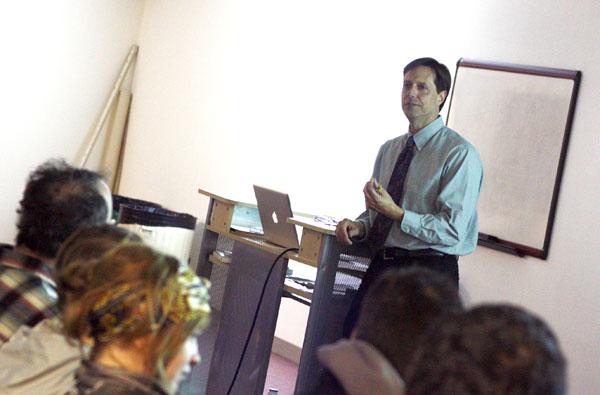
Clyde Hodge, a professor of psychiatry and pharmacology at the University of North Carolina at Chapel Hill, gave a lecture to an audience of mostly graduate students and regional professors last Friday about the findings of his research on the neurobiological roots of alcohol addiction.
Hodge said he hopes his research will increase doctors’ understanding of the chemistry behind alcohol addiction.
“Alcohol is so commonly abused in our culture but in spite of that we have no good understanding of how the addiction process emerges,” Hodge said.
The lecture was attended by an audience of mostly graduate students and regional professors last Friday.
Hodge’s research showed that CaMKII, a protein “molecular memory switch,” is activated in the brain by alcohol use. He said that when the protein is activated it can reinforce the satisfaction of alcohol consumption in a subject.
Hodge said he believes CaMKII may be a specific neurological circuit that explains why the human brain finds alcohol consumption rewarding.
“To understand addiction you have to understand why the human seeks the drug,” Hodge said. “Alcohol is a re-enforcer.”
Hodge said that his research and similar research may lead to new therapeutic strategies and medications to treat alcohol addiction. He called alcoholism an illness that currently lacks effective treatment.
“If someone uses alcohol over a long period of time, their brain is fundamentally altered,” Hodge said. “The culmination of our work is to identify targets in the brain that could lead to addiction. If you block [the targets] for a time, you may get to reverse some of those changes.”
Steven Youngentob, a professor of neuroscience and physiology at SUNY Upstate Medical University, said he also considered Hodge’s research important to understanding addiction.
“[Hodge’s research] helps us understand some of the underlying mechanisms behind addiction,” Youngentob said. “Understanding mechanisms is critical to finding new treatments.”
Cara Hueston, a graduate student in psychology, said she thought many people will want to study Hodge’s findings.
“Overall, he’s looking at the neuromechanisms that underlie alcohol addiction and what might be contributing to that,” Hueston said. “It’s a very hot topic.”
Hodge said that alcohol addiction is a pervasive problem in broader society and that treating the addiction is critical to improving public health.
“It’s a bigger problem than diabetes, and it cuts across all aspects of society,” Hodge said. “10 percent of Americans struggle with alcoholism. That’s 10 percent of teachers, professionals, policeman and students — it doesn’t care. I really think that some medical treatments could help the public as a whole.”


